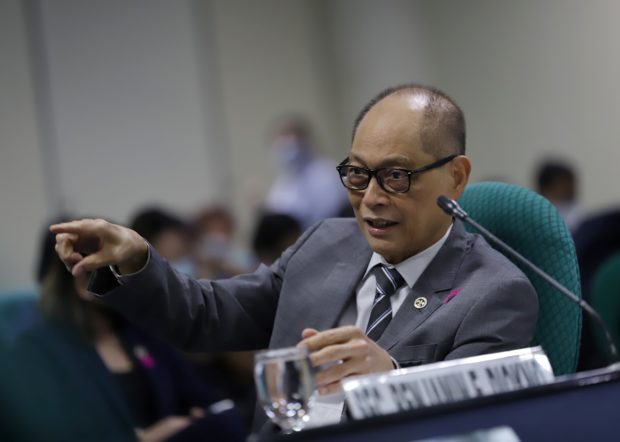Diokno says Marcos’ rice price cap would manage market pressures
MANILA, Philippines — President Ferdinand “Bongbong” Marcos Jr.’s price cap on rice would effectively manage the upward pressures in the market due to non-competitive practices, Finance Secretary Benjamin Diokno said on Monday.
Diokno, in a statement said that price caps, such as the President’s Executive Order No. 39, will be effective in short-term spans if “carefully calibrated and closely implemented”.
Marcos signed E.O. No. 39 last August 31, placing a P41 per kilogram ceiling on regular milled rice, and P45 per kilogram on well-milled rice.
“To manage upward pressures in the price of rice, the imposition of price control on rice through Executive Order No. 39 serves as a short-term measure against non-competitive practices by market players. Price controls, when carefully calibrated and closely implemented, are effective in the near term,” he said.
READ: Bongbong Marcos orders price caps for rice at P41 to P45 per kilo
According to Diokno, the government is doing what it can to address the impact of inflation to consumers and farmers alike.
Article continues after this advertisementLast September 5, the the Philippine Statistics Authority (PSA) announced that headline inflation rates for August increased to 5.3 percent, breaking a six-month downtrend. Despite this, Diokno said their projection of a 5 to 6 percent annual inflation rate for 2023 is still possible.
Article continues after this advertisementREAD: Philippine inflation rose to 5.3% in August
“The government is resolute in its commitment to mitigate the impact of inflation and help protect our consumers, retailers, and farmers. While we are seeing a slight uptick, our inflation rate assumption of 5 to 6 percent for full year 2023 remains doable,” Diokno said.
“The IAC-IMO (Inter-agency Committee on Inflation and Market Outlook) continues to help the national government identify and implement various measures that will mitigate inflationary pressures in a timely and relevant manner,” he added.
According to a PSA report, the main contributors to the higher August inflation rate are food and non-alcoholic beverages, which accounted for 3.1 percentage points to the 5.3 percent headline inflation.
Meanwhile, restaurants and accommodation services contributed 0.7 percentage points, while housing, water, electricity, gas and other fuels was responsible for 0.5 percentage points.
According to the Presidential Communications Office, Marcos signed E.O. No. 39 to counter the following factors that brought rice prices up:
- illegal price manipulations like hoarding and industry collusion
- global events outside the country’s control, such as the Russia-Ukraine conflict
- India’s rice export ban
- capricious oil prices in the international market
The imposition of the price cap, however, drew mixed reactions — as Senators Risa Hontiveros and JV Ejercito believe that stricter enforcement of laws, and not a mere price cap, would address hoarding.
READ: Marcos’ order to set price cap on rice draws mixed reactions from senators
Members of the House’ Makabayan bloc and Agri party-list Rep. Wilbert Lee also warned that it might affect small retailers which do not have control over the production costs of rice — leading to low income for retailers or fewer rice being sold.
These concerns prompted House Speaker Ferdinand Martin Romualdez to allocate P2 billion from the country’s existing funds to help small retailers that would be affected by the order.
